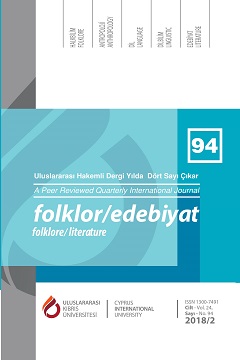Geleneksel Cinsiyet Tayini Uygulamalarının Günümüz Kent Toplumuna Evrimine Bir Örnek: “Cinsiyet Partileri”
A Case of the Evolution of the Traditional Gender Determination Practices for Today’s Urban Society: “Gender Parties”
Author(s): Aslı Büyükokutan TöretSubject(s): Gender Studies, Customs / Folklore, Demography and human biology, Sociology of Culture
Published by: Uluslararası Kıbrıs Üniversitesi
Keywords: tradition; gender determination; baby; party; change; transformation;
Summary/Abstract: Along with the pregnancy symptoms, the curiosity about the gender of the baby also starts. Practices to satisfy this curiosity develop, change, and get updated by emerging based on the expectation and values of the related culture. In the traditional social life in Turkey, the curiosity about the gender is tried to be satisfied with certain practices such as looking at the shape of some parts in the pregnant body, pains in particular parts of her body, the food she wants in the craving period, baby’s movements in the mother’s womb etc. In addition, between the fourteenth and sixteenth week of pregnancy, the baby’s gender is explained to the future parents with ultrasound method. On the other hand, today there are celebrations that are called “gender parties,” are spreading rapidly, and even these parties are candidates to become a serious business sector in urban society. The main aim of these parties abroad, especially in America, is that the couples want to learn the baby’s gender in a more sincere and special atmosphere where acquaintances and relatives are present instead of the hospital and doctors. Organized under the guidance of the mother and father to be, these parties have important functions in terms of sharing their excitement with their loved ones, getting moral support from them, having fun together, communicating and getting relieved, solidarity, helping each other and improving their sense of belonging. In the article, gender parties are discussed in terms of their contents, way, place and time of organization, participants, and hosts, and observations and interpretations are made regarding their individual and social functions. As a result of the examinations and evaluations made, it is concluded that especially the future mother and father’s curiosity about the baby’s gender is still a big issue, however, the environment and conditions, in which this curiosity is satisfied, are changing.
Journal: Folklor/Edebiyat
- Issue Year: 24/2018
- Issue No: 94
- Page Range: 103-118
- Page Count: 16
- Language: Turkish

